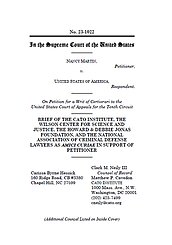Learn more about Cato’s Amicus Briefs Program.
Petitioner Nancy Martin is 79 years old and was a respected member of her community, as well as the longtime administrator for two healthcare companies. Around 2005, however, she began diverting money from those companies to her own creditors. In July 2016, she began to repay the money that she had taken. And in May 2017, Ms. Martin came clean to her employers, informing them that she had taken money but was paying it back.
She was fired. Nearly four years later, Ms. Martin was indicted for bank fraud and aiding in the preparation of false tax documents. She pleaded guilty under a plea agreement that included a waiver of virtually all of her appellate and post-conviction rights.
However, Ms. Martin may have been led to plead guilty despite there not being a sufficient factual basis for the charges against her. She retained new attorneys and sought to appeal her convictions. The district court released her from custody, finding that “her appeal involves substantial questions” that could lead her convictions to be reversed. The government, though, moved to enforce her appeal waiver. The Tenth Circuit granted that motion and dismissed Ms. Martin’s appeal, even as it acknowledged that significant authority from other federal appellate courts would have let Ms. Martin appeal.
Cato filed an amicus brief asking the Supreme Court to grant certiorari and reverse the Tenth Circuit’s decision. It is essential that the Court clarify the scope and validity of appeal waivers given how much of a role plea bargaining has in the current criminal justice system. Ms. Martin’s waiver should be invalidated under the contract-law doctrines of mutual mistake and unconscionability that ought to govern plea agreements. And plea agreements must be construed narrowly against the government because of its extraordinary power over defendants.
The Court has held that “the moral force of the criminal law not be diluted by a standard of proof that leaves people in doubt whether innocent men are being condemned.” Appeal waivers leave potentially innocent people like Ms. Martin convicted, and even imprisoned, with no chance of an appellate remedy. That must end.

This work is licensed under a Creative Commons Attribution-NonCommercial-ShareAlike 4.0 International License.

